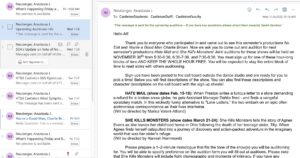Email restrictions inhibit communication to students

Currently at Vermont State University at Castleton, only a handful of people have the ability to send out mass emails and students and faculty are being greatly affected.
An email was sent out on Nov. 8 addressing updates to the use of the “all students” email list.
In the email, Kelley Beckwith, vice president of Student Success wrote, “Currently, Vermont State relies on mass emails as a primary means of communicating with our students. This practice has led to an overload of emails on a daily basis. To address this issue, we are working on a project to introduce new communication tools in about a year, which will help reduce our dependence on email as the primary means of communication.”
The email contains two documents, the first being an “Addendum to Student Email Policy” that states, “This addendum outlines which mailboxes can send to the Students@VermontState.edu list. Before sending, one or two approvers as designated in the student email policy must approve the email.”
The second document contains the Email Policy for the Student Email List. The new policy is supposed to reduce our reliance on email.
Since the merger has taken place, many responsibilities have been shifted, including those for Area Coordinator Anastasia Neuberger, who is one of the few who now has the ability to send out mass emails.
“After the assistant director of student activities left, James Wolf, they needed someone to be an advisor to SGA and CAB, so I was asked to be that person. So I go to all their meetings, program shop for them, stuff like that,” Neuberger said.
“They allowed me to have the ability to send out mass emails so I could send out different Student Government forms, emails, club emails, things like that.”
Neuberger often gets requests to send out emails for events like school plays and the Sparty Says newsletter, and said it can be a bit much as one of the few who can send them these days.
“Yes, sometimes it can be. But I would say that I don’t mind helping students who need help and I know that they are doing something good for the community and students and faculty,” she said.
Clubs and organizations are also being greatly affected because the presidents are not able to send out mass emails.
Kayon Morgan, president of the Castleton branch of the NAACP, talked about how it has affected her position. For the NAACP, email is a primary tool for communicating to the public and getting people involved.
“We consistently see that minority organizations don’t have a history of surviving a long time in the Castleton community because of the lack of membership. And, so with that what we’ve seen is that membership has declined extremely because students are, one, not reading a lot of emails that are coming from the one person, and two, it’s so hard to reach students and let them know what’s happening,” Morgan said.
“Like if they’re not on our specific email list, it’s so hard to get them to come to a meeting, let them know about events that are happening. It’s definitely taken a toll on us and seriously, as president, I’m seriously concerned that if this doesn’t change soon that not only the NAACP but a lot of clubs and organizations that are pivotal to student life, to the unification of students, well wither because they can’t maintain membership,” she continues.
Morgan said this is the latest of a lot of frustrations that have come along with this new development of the merger.
“I think my biggest frustration is that we’ve worked so hard to gain such a presence in the Castleton community. We’ve worked so hard to gather an audience and just maintain the connections and just serve as a communication point for whenever something serious or non-serious is happening on campus,” she said.
“The university benefits 100 percent from having the NAACP charter here. Yet it seems like they don’t really care about the survival of the chapter and that’s frustrating,” she added.
Morgan discusses how the student body is facing a huge disconnection between the people holding the information and how they’re getting it out to students.
“It’s just creating a disconnect. I call it censorship, that’s what I call it,” Morgan said.
“It’s a ploy to censor students in certain clubs, censor organizations, limit their ability to reach and talk about what happening.”
“It seems to me that our university really wants to continue making decisions that will impact our community and then they want to silence us. They kind of want to say, ‘this is what we did, and you can’t say anything about it’ and emails were one of the main ways that we let people know what’s happening.”
The clubs and organizations are really being affected by the lack of communication. Students find that it is creating a divide between all of us.
“I just strongly urge administration to just really consider the long term and detrimental impacts that this is having on student success, student engagement, and it’s going to have on student retention,” Morgan said. “At the end of the day, students talk to students, and current college students talk to high school students that are going to come in and it’s just unfortunate. And for all the students, I just want to say stay strong and try to support each other because it’s hard.”







